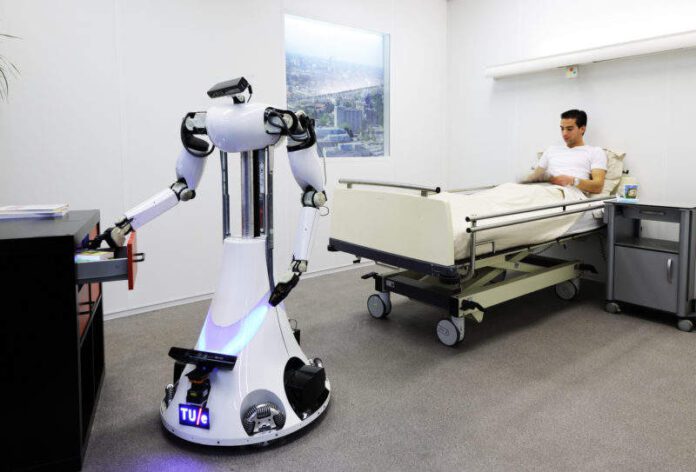Unveiling the Robotic Companions
In the heart of Paris, in the 15th arrondissement, a unique spectacle unfolds. Justin Santamaria, fingers dancing across his iPad, breathes life into Zora, a humanoid robot. Standing the size of a baby, Zora captivates a group of elderly ladies seated in anticipation. This is no ordinary scene; it’s a glimpse into the future of elderly healthcare.
Zora Takes Center Stage
In the heart of Paris, within the 15th arrondissement, a groundbreaking spectacle unfolds as Zora, a humanoid robot, takes center stage in transforming the landscape of elderly care. Since her introduction in February 2019, Zora has become more than just a technological marvel; she has become a companion, a fitness instructor, and a source of joy for the residents of a nursing home managed by Maisons de Famille.
A Blend of Technology and Human Touch
The uniqueness of Zora’s role lies in the seamless blend of technology and human touch. While Zora demonstrates the exercises and engages the participants, Justin is free to provide individual attention. This dynamic interaction enhances the fitness sessions, creating an atmosphere where residents feel both supported by advanced technology and the personal guidance of a human instructor.
Personalized Care Programs
Maisons de Famille has strategically integrated Zora into personalized care programs for the elderly residents. These programs encompass a range of activities tailored to address the specific needs and preferences of each individual. Whether it’s exercises for strength and balance, group singing sessions, or interactive readings, Zora plays a multifaceted role in enhancing the overall well-being of the residents.
The Rise of Social Robots in Elderly Care
Maisons de Famille Embraces Innovation
For Maisons de Famille, a chain of private nursing homes in France, Zora represents more than just a futuristic gadget. She symbolizes a conscious effort to innovate and enhance the well-being of elderly residents. Delphine Mainguy, the director general of Maisons de Famille, emphasizes the role of Zora in personalized care programs, ranging from strength exercises to singing sessions.
Beyond Entertainment: A Therapeutic Touch
Zora’s impact extends beyond entertainment. Studies, although anecdotal at this stage, suggest that social robots like Zora add value to conventional care. Boris Prévost, head of marketing and innovation at Maisons de Famille, shares stories of residents with dementia finding new means of communication through Zora’s influence. The robot becomes a catalyst for positive changes, aiding in treatments that don’t rely on medication.
Zorabots: Bringing Zora to Life
Zorabots, a Belgium-based robotics company, has played a pivotal role in bringing Zora to life. With Zora implemented in nearly 400 healthcare establishments globally, including countries like Australia, Belgium, the Netherlands, and the United States, the impact is evident. The company’s success stories include instances of residents rediscovering the joy of conversation and engaging in activities they once resisted.
UK’s Encounter with Pepper: A Social Care Dynamo
Pepper in Southend-on-Sea
In the United Kingdom, the borough council of Southend-on-Sea in Essex has integrated Pepper, a child-sized humanoid robot, into its social care team. Maxine Nutkins, the council’s community engagement manager, witnesses remarkable transformations. Pepper engages residents in reminiscing sessions, unlocking memories and fostering meaningful interactions.
A Boon for Children with ASD
Pepper’s value shines even brighter in schools for children with Autism Spectrum Disorder (ASD). Pepper’s consistent, pressure-free engagement becomes a bridge for children who struggle with human interactions. The robot’s role in creative writing workshops proves particularly beneficial, providing a platform for self-expression and collaboration.
The Future: Robots in Mental Health Treatment
Professor Daniel David’s Vision
Professor Daniel David, head of the department of clinical psychology and psychotherapy, envisions a future where robots contribute significantly to mental health treatment. Projects like the European Commission-funded initiative in Romania explore the potential of supervised autonomous robots. These robots, equipped with artificial intelligence, aim to assess behavior, provide therapeutic responses, and act as diagnostic tools.
The Role of Robots in ASD Treatment
Professor David’s team utilizes robots like Probo and Nao to aid children with ASD. The robots model communication skills and facilitate role-playing for social skill development. The next frontier involves developing robots capable of autonomous learning, leveraging artificial intelligence to adapt therapeutic approaches based on experiences.
Beyond Companionship: Robots in Healthcare
Innovative Ventures in Healthcare
The landscape of robotic technology in healthcare is evolving rapidly. In Toulouse, French start-up New Health Community develops Charlie, a medical-care robot designed for hospitals. Charlie not only keeps patients company but also entertains and informs, showcasing the potential for technology in healthcare settings.
Samsung’s Bot Care: A Personal Healthcare Assistant
Samsung, a technology giant, introduces Bot Care, a moving, talking robot designed to help and monitor sick, disabled, and elderly individuals at home. With features like measuring vital signs, medication reminders, and emergency alerts, Bot Care aims to provide personalized care and support.
No Isolation’s AV1: Bridging Gaps in Education
Norwegian company No Isolation addresses the educational aspect of chronic illnesses with AV1. This desktop robot, available for rent, enables children with chronic illnesses to participate in school remotely through live-streaming technology. It exemplifies how robots can bridge gaps and enhance the quality of life for those facing health challenges.
The Ethical Stance: Robots as Complements, Not Replacements
Zorabots’ Perspective
While robots like Zora and Pepper make significant contributions to various aspects of care, the founders of Zorabots emphasize a crucial point – robots are not meant to replace human warmth and expertise. Tommy Deblieck
and Fabrice Goffin, co-founders of Zorabots, assert that robots should complement human efforts, providing additional support without replacing the irreplaceable human touch.
Conclusion: Navigating the Future of Elderly Care
In the unfolding narrative of robotic integration in elderly care, one thing is clear – these technological marvels are not just gadgets; they are companions, facilitators, and catalysts for positive change. From Zora’s dance sessions in Paris to Pepper’s transformative role in Southend-on-Sea, robots are reshaping the landscape of healthcare and well-being. As we embrace the future, the collaboration between human caregivers and robotic companions promises a harmonious symphony, where innovation enhances, but never replaces, the essence of compassionate care for our elderly population.










